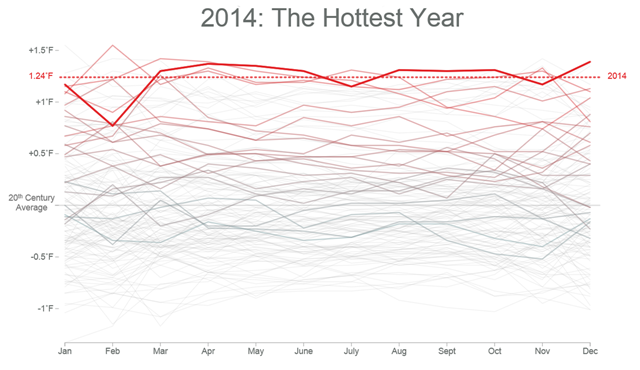NOAA: 2014 was warmest year on record – ‘The record temperatures underscore the undeniable fact that we are witnessing, before our eyes, the effects of human-caused climate change’
16 January 2015 (Associated Press) – Federal science officials say that for the third time in a decade, the globe sizzled to the hottest year on record. Both the National Oceanic and Atmospheric Administration and NASA calculated that 2014 was the hottest year in 135 years of record-keeping. Earlier, the Japanese weather agency and an independent group out of University of California Berkeley also measured 2014 as the hottest on record. NOAA said 2014 averaged 58.24 degrees Fahrenheit, 1.24 degrees above the 20th-century average. NOAA had previously reported that Earth broke heat records in 2010 and 2005. NOAA also said last month was the hottest December on record. Last year, six months set marks for heat. Rutgers University’s Jennifer Francis and other climate scientists said this shows global warming continues unabated.
NOAA: 2014 Was Warmest Year on Record
By Michael Mann
16 January 2015 (Facebook) – Three major climate organizations (JMA, NASA, and NOAA) have now released their official estimates for the 2014 Global Mean Surface Temperature. Both JMA and NOAA conclude that 2014 was substantially higher, i.e., outside the margin of error, of previous contenders (1998, 2005, and 2010) while NASA finds 2014 to be warmest, but within the margin of error of 2005 and 2010 (i.e., a “statistical tie”). Based on the collective reports, it is therefore fair to declare 2014 the warmest year on record. This is significant for a number of reasons. Unlike past record years, 2014 broke the record without the “assist” of a large El Niño event. There was only the weakest semblance of an El Niño and tropical Pacific warmth contributed only moderately to the record 2014 global temperatures. Viewed in context, the record temperatures underscore the undeniable fact that we are witnessing, before our eyes, the effects of human-caused climate change. It is exceptionally unlikely that we would be seeing a record year, during a record warm decade, during a multidecadal period of warmth that appears to be unrivaled over at least the past millennium, were it not for the rising levels of planet-warming gases produced by fossil fuel burning. The record temperatures should put to rest the absurd notion of a “pause” (what I refer to as the “Faux Pause” in Scientific American) in global warming. There is a solid body of research now showing that any apparent slow-down of warming during the past decade was likely due to natural short-term factors (like small changes in solar output and volcanic activity) and internal fluctuations related to, e.g., the El Niño phenomenon. The record 2014 temperatures underscore the fact that global warming and associated climate changes continue unabated as we continue to raise the concentrations of greenhouse gases in the atmosphere.
